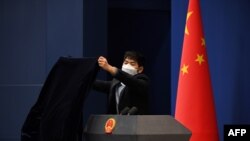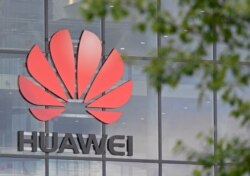The coronavirus pandemic may prompt Britain to abandon an already contentious deal with the Chinese telecom giant Huawei — retaliation, officials say, for the spread of disinformation by Beijing about the origins of the virus and for its evasiveness about the scale and infectiousness of the disease.
Downing Street officials say Beijing should face a "reckoning" over the coronavirus, which first appeared in the Chinese city of Wuhan late last year.
As the death toll from COVID-19 increases in Britain, several Cabinet ministers are urging Prime Minister Boris Johnson to reverse his decision to allow Huawei to build part of Britain's new 5G telecoms network, a decision the U.S. lobbied against on security grounds before the virus appeared.
Several British newspapers have reported that Johnson is leaning toward reversal.
Anger toward the Beijing government has been boiling for weeks in London and other Western capitals after Chinese propagandists blamed the coronavirus outbreak on a U.S. Army sports delegation in the city of Wuhan and spread conspiracy theories that have been discredited by virologists and epidemiologists.
British and U.S. officials say Beijing seems determined to avoid addressing public criticism of its longtime refusal to regulate wet markets where live animals such as cats, dogs, fish, rabbits and bats are sold.
The coronavirus is suspected of having originated in a Wuhan wet market, jumping from an animal, likely a bat or pangolin, to a human. This, in turn, sparked the global pandemic that so far has killed more than 41,000 people, infected 850,000 and prompted an unprecedented economic crisis.
Much of the anger focuses on what British officials say was Beijing's efforts to cover up the scale and danger of the virus.
On Dec. 9, 2019, Chinese state broadcaster CCTV reported on the first case of COVID-19 identified in Wuhan. But it was not until Dec. 31, after suppressing Chinese doctors' warnings, that the country officially warned the World Health Organization that it had detected "pneumonia of unknown etiology," say analysts and Western officials.
"Some of the reporting from China was not clear about the scale, the nature, the infectiousness of it," Michael Gove, a senior British minister, told the BBC this week.
Iain Duncan Smith, a former Conservative Party leader, said the world would have had more time to prepare for the pandemic if Chinese leaders had been more forthcoming.
"For too long, nations have lamely kowtowed to China in the desperate hope of winning trade deals. Once we get clear of this terrible pandemic it is imperative that we all rethink that relationship," he said.
Deflecting blame?
While acknowledging that some of the criticism aimed at China might be fair, some opposition politicians and activists in Britain say the Conservative Party is deflecting blame for its failings in response to the virus. The British government is experiencing growing criticism for its lack of testing and other health care preparations.
"We need to understand precisely how ministers were responding, rather than feeble excuses that they didn't know," warned Ed Davey, leader of Britain's Liberal Democrats. "The evidence this was a serious virus was well-documented through January into February."
British leaders are not alone in arguing for a reordering of the West's relations with China.
Beijing's efforts to reframe the history of the pandemic is doing little to assuage growing fury among some Western leaders who see Chinese misinformation and disinformation as an attempt to shift blame and look more successful in handling the virus than global rivals. Beijing's critics say the country is still downplaying the death toll and numbers of those infected in the country.
In Washington, there is growing talk of economic and technological separation from China, with lawmakers calling for a scaling back of U.S. reliance on prescription drugs, medical supplies and other critical resources from China.
In Europe, Chinese ambassadors and embassies have rejected any criticism of Beijing, calling it racist in complaints to national newspapers and in published statements.
'Politics of generosity'
China has been praised by some Western leaders for sending doctors and exporting ventilators, masks and other medical aid to more than 80 countries. Serbian President Aleksandar Vucic, Hungarian Prime Minister Viktor Orban and Italy's Minister of Foreign Affairs Luigi Di Maio have compared Chinese assistance with fraying European solidarity in the face of the pandemic.
But the virus diplomacy has backfired in many quarters, with calls in other Western countries for Chinese accountability, including reparations or debt forgiveness on loans Beijing provided through its Belt and Road Initiative, a global development strategy started by the Chinese government in 2013.
The European Union's foreign policy chief, Josep Borrell, last week criticized what he said was China's bid to seek geopolitical advantage by exploiting "politics of generosity." Other critics note that some medical supplies were not donated but sold to countries struggling to contain the potentially deadly virus.
The coronavirus has handed a weapon to Western politicians, both populist and establishment, who were already uncomfortable with China's geopolitical ambitions.
Italian main opposition leader Matteo Salvini, an outspoken critic of China, has accused the country of committing "a crime against humanity." In 2019, Salvini refused to endorse a $2 billion trade deal with China, saying it amounted to "colonization."
Long-term fallout?
It remains unclear whether China will pay a price for the pandemic, according to Gary Schmitt, a strategic analyst who studies at the American Enterprise Institute, a Washington research group.
Writing in The American Interest magazine, Schmitt noted, "In recent years, there has been an obvious change in how many in the West view China. But one has yet to see a fundamental reordering of relations with Beijing in Berlin, Paris or London, despite that change. Even in the case of Washington, there is a question of just how far America will be willing to go in disengaging from the Chinese market."
Other analysts say Western corporations are questioning whether they should remain overly dependent on Chinese supply chains.
"The outbreak is adding to the concerns of multinational corporations with supply chains based in China," said Paul Haenle of the Carnegie–Tsinghua Center, based at China's Tsinghua University.
"Companies that had been considering diversifying their supply chains because of the U.S.-China trade war are likely to feel further validated and accelerate their plans," he said.









